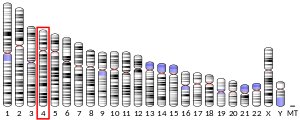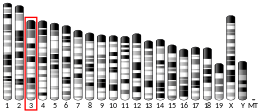RAPGEF2
Rap guanine nucleotide exchange factor 2 is a protein that in humans is encoded by the RAPGEF2 gene.[5][6][7]
Function
Members of the RAS subfamily of GTPases function in signal transduction as GTP/GDP-regulated switches that cycle between inactive GDP- and active GTP-bound states. Guanine nucleotide exchange factors (GEFs), such as RAPGEF2, serve as RAS activators by promoting acquisition of GTP to maintain the active GTP-bound state and are the key link between cell surface receptors and RAS activation.[6]
Interactions
RAPGEF2 has been shown to interact with RAP1A[6] and RALGDS.[10]
gollark: I don't think they can actually void the warranty for using custom firmware, in good™ countries.
gollark: Redesign it better.
gollark: Oh, or some shared library issue.
gollark: Anyway, I recommend redesigning your network.
gollark: I think that generally means some kind of executable format error for ??? reasons.
References
- GRCh38: Ensembl release 89: ENSG00000109756 - Ensembl, May 2017
- GRCm38: Ensembl release 89: ENSMUSG00000062232 - Ensembl, May 2017
- "Human PubMed Reference:". National Center for Biotechnology Information, U.S. National Library of Medicine.
- "Mouse PubMed Reference:". National Center for Biotechnology Information, U.S. National Library of Medicine.
- Nagase T, Ishikawa K, Nakajima D, Ohira M, Seki N, Miyajima N, Tanaka A, Kotani H, Nomura N, Ohara O (September 1997). "Prediction of the coding sequences of unidentified human genes. VII. The complete sequences of 100 new cDNA clones from brain which can code for large proteins in vitro". DNA Res. 4 (2): 141–50. doi:10.1093/dnares/4.2.141. PMID 9205841.
- Rebhun JF, Castro AF, Quilliam LA (November 2000). "Identification of guanine nucleotide exchange factors (GEFs) for the Rap1 GTPase. Regulation of MR-GEF by M-Ras-GTP interaction". J Biol Chem. 275 (45): 34901–8. doi:10.1074/jbc.M005327200. PMID 10934204.
- "Entrez Gene: RAPGEF2 Rap guanine nucleotide exchange factor (GEF) 2".
- Pham N, Cheglakov I, Koch CA, de Hoog CL, Moran MF, Rotin D (May 2000). "The guanine nucleotide exchange factor CNrasGEF activates ras in response to cAMP and cGMP". Curr. Biol. 10 (9): 555–8. doi:10.1016/S0960-9822(00)00473-5. PMID 10801446.
- Emery AC, Eiden MV, Mustafa T, Eiden LE (2013). "Rapgef2 Connects GPCR-Mediated cAMP Signals to ERK Activation in Neuronal and Endocrine Cells". Sci Signal. 6 (281): ra51. doi:10.1126/scisignal.2003993. PMC 3932028. PMID 23800469.
- Spaargaren M, Bischoff JR (December 1994). "Identification of the guanine nucleotide dissociation stimulator for Ral as a putative effector molecule of R-ras, H-ras, K-ras, and Rap". Proc. Natl. Acad. Sci. U.S.A. 91 (26): 12609–13. doi:10.1073/pnas.91.26.12609. PMC 45488. PMID 7809086.
Further reading
- Andersson B, Wentland MA, Ricafrente JY, et al. (1996). "A "double adaptor" method for improved shotgun library construction". Anal. Biochem. 236 (1): 107–13. doi:10.1006/abio.1996.0138. PMID 8619474.
- Yu W, Andersson B, Worley KC, et al. (1997). "Large-scale concatenation cDNA sequencing". Genome Res. 7 (4): 353–8. doi:10.1101/gr.7.4.353. PMC 139146. PMID 9110174.
- Ohtsuka T, Hata Y, Ide N, et al. (1999). "nRap GEP: a novel neural GDP/GTP exchange protein for rap1 small G protein that interacts with synaptic scaffolding molecule (S-SCAM)". Biochem. Biophys. Res. Commun. 265 (1): 38–44. doi:10.1006/bbrc.1999.1619. PMID 10548487.
- Liao Y, Kariya K, Hu CD, et al. (2000). "RA-GEF, a novel Rap1A guanine nucleotide exchange factor containing a Ras/Rap1A-associating domain, is conserved between nematode and humans". J. Biol. Chem. 274 (53): 37815–20. doi:10.1074/jbc.274.53.37815. PMID 10608844.
- de Rooij J, Boenink NM, van Triest M, et al. (2000). "PDZ-GEF1, a guanine nucleotide exchange factor specific for Rap1 and Rap2". J. Biol. Chem. 274 (53): 38125–30. doi:10.1074/jbc.274.53.38125. PMID 10608883.
- Chikumi H, Fukuhara S, Gutkind JS (2002). "Regulation of G protein-linked guanine nucleotide exchange factors for Rho, PDZ-RhoGEF, and LARG by tyrosine phosphorylation: evidence of a role for focal adhesion kinase". J. Biol. Chem. 277 (14): 12463–73. doi:10.1074/jbc.M108504200. PMID 11799111.
- Wistow G, Bernstein SL, Wyatt MK, et al. (2002). "Expressed sequence tag analysis of adult human lens for the NEIBank Project: over 2000 non-redundant transcripts, novel genes and splice variants". Mol. Vis. 8: 171–84. PMID 12107413.
- Aurandt J, Vikis HG, Gutkind JS, et al. (2002). "The semaphorin receptor plexin-B1 signals through a direct interaction with the Rho-specific nucleotide exchange factor, LARG". Proc. Natl. Acad. Sci. U.S.A. 99 (19): 12085–90. doi:10.1073/pnas.142433199. PMC 129402. PMID 12196628.
- Strausberg RL, Feingold EA, Grouse LH, et al. (2003). "Generation and initial analysis of more than 15,000 full-length human and mouse cDNA sequences". Proc. Natl. Acad. Sci. U.S.A. 99 (26): 16899–903. doi:10.1073/pnas.242603899. PMC 139241. PMID 12477932.
- Kimura K, Wakamatsu A, Suzuki Y, et al. (2006). "Diversification of transcriptional modulation: large-scale identification and characterization of putative alternative promoters of human genes". Genome Res. 16 (1): 55–65. doi:10.1101/gr.4039406. PMC 1356129. PMID 16344560.
- Hisata S, Sakisaka T, Baba T, et al. (2007). "Rap1-PDZ-GEF1 interacts with a neurotrophin receptor at late endosomes, leading to sustained activation of Rap1 and ERK and neurite outgrowth". J. Cell Biol. 178 (5): 843–60. doi:10.1083/jcb.200610073. PMC 2064548. PMID 17724123.
This article is issued from Wikipedia. The text is licensed under Creative Commons - Attribution - Sharealike. Additional terms may apply for the media files.



